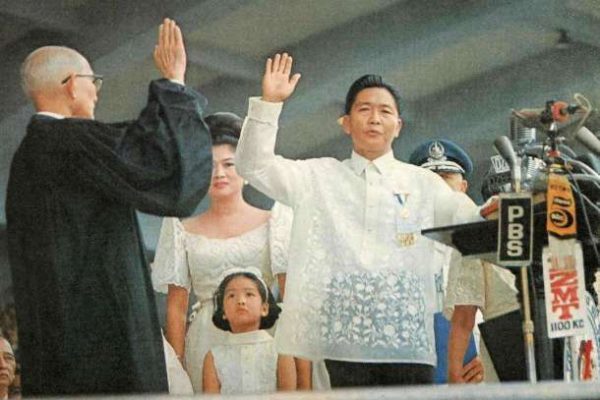Justice takes time but it comes
September 24, 2020 · By Mary Aileen D. Bacalso, Manila for www.ucanews.com

Ferdinand Marcos takes his oath as president of the Philippines at the Quirino Grandstand in Manila on Dec. 30, 1965. (Photo: Wikipedia)
Justice takes time but it comes
Sept. 21, 2020, marks the 48th anniversary of the declaration of martial law imposed by the Philippines’ late dictator Ferdinand E. Marcos. The date is reminiscent of victims of human rights violations, thousands of whom tragically perished — tortured, killed, involuntarily disappeared.
On the Wall of Remembrance in the Bantayog ng Mga Bayani, more than 300 names of victims are engraved as an important memorial to the lives they offered to the altar of freedom so that future generations may see a better tomorrow.
The names include Italian priest Father Tulio Favali, parish priest Father Zacarias Agatep, disappeared priest Father Rudy Romano, student activists Rizalina Ilagan and Liliosa Hilao, and world renowned Senator Benigno Aquino.
Others survived to tell their stories. Loretta Ann Rosales, imprisoned and tortured during the Marcos dictatorship, reacted against the bill declaring a holiday in Marcos’ hometown to commemorate the birth of the ousted dictator every Sept. 11.
“We do not celebrate dictators. We topple them. We bury them in the dustbin of history. We reserve our holidays for our brave heroes and martyrs, not for tyrants who oppressed and killed many of our people,” she said.
Indeed, the bill adds yet another insult to injury for the victims of the dictatorship. Daisy Valerio, wife of Nilo Valerio who involuntarily disappeared on Aug. 24, 1985, reflected: “The pain of suddenly losing my husband is still fresh in my heart and mind. Designating a special day for the dictator is certainty an additional burden for those who suffered because of him.”
In 2016, under the present Duterte administration, the remains of the dictator were ironically buried in the heroes’ resting place. The present administration’s reverence of Marcos as a “hero” exonerates the late dictator and allows impunity to prevail.
Amidst historical revisionism, those who witnessed the horrors of martial law have the huge task of rewriting history. For the young, who were not yet born during those darkest moments, to understand where they stand and to chart the country’s destiny, a critical study and profound analysis of history are a challenge. Indeed, against the backdrop of an administration that hero-worships Marcos and promotes historical revisionism to serve the interests of the status quo, re-educating the young is such a gargantuan task.
The martial law anniversary reminds us of the late Cardinal Jaime Sin, one of the courageous leaders who was instrumental in the toppling of the dictator. He consistently stood in favor of the people, not only during the four-day EDSA revolution but also during the many years of fighting the 21-year dictatorship. His example, and those of many other church people persecuted because of their work for the poor, the deprived and the oppressed, are worth imitating.
In commemorating this painful epoch in Philippine history, reflecting on a major victory in the struggle against impunity in far distant El Salvador is inspiring.
On Sept. 11, the National Court of Spain convicted a Salvadoran military colonel for acts of state terrorism and murder in the assassination of six Jesuit priests, their housekeeper and their daughter on the morning of Nov. 16, 1989. The tribunal found Inocente Orlando Montano guilty of five counts of murder of a terrorist nature.
The exhumation of skeletons inside the closet on the US role in El Salvador’s war is likened to an ant’s work — tiny and step by step. The years of persistence led to the accumulation of excellent reports, details, contexts and corroborative evidence that have proven crucial to the prosecution of human rights violators.
Having visited El Salvador twice and seen the Jesuits Museum in the Universidad Centro Americana, where bloodstained clothes of the assassinated Jesuits were displayed, I feel proud of the Salvadorean human rights defenders for their tenacity, courage and persistence. They are a paragon of persistence in the struggle for truth, justice, reparation, memory and guarantees of non-repetition.
Both the Philippines and El Salvador experienced and continue to experience the dark night of human rights violations. The Salvadoran experience of obtaining truth after more than three decades of struggle speaks the truth about the saying “La justicia tarda, pero llega” (Justice takes time but it comes). It is an important inspiration for the struggle for truth and justice in the Philippines, no matter how far from sight justice is.
Mary Aileen D. Bacalso is president of the International Coalition Against Enforced Disappearances (ICAED). The views expressed in this article are those of the author and do not necessarily reflect the official editorial position of UCA News






